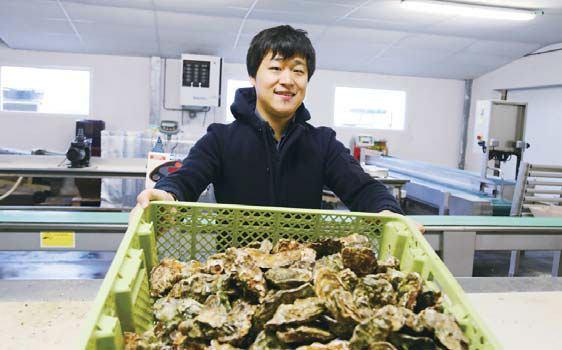Trio find recipe to export from France to China
Wang Renjie and two partners are exporting oysters, successfully targeting the high-end market in Wang's home country
Young Chinese entrepreneur Wang Renjie took a calculated risk when, only in his 20s, he gave up a steady job in 2014 to start his own oyster export business in Paris with two French partners in their 40s.
Once or twice a week, he starts his workday at 3 am at Paris Charles de Gaulle Airport to send five tons of fresh French oysters to China.
|
Wang Renjie says China has huge demand for imported agriculture products. Tuo Yannan / China Daily |
"I love oysters. Each time I send them to my home country, I pack and move them by myself," he says.
Wang moved to France to pursue his studies in 2004 and, after graduation, he went to work for a French company that exports wood. But because of his passion for French food, he decided to quit his job and open a company to sell French oysters to China.
"Agriculture is a very strong pillar industry in France, and China as an emerging market has huge demand for imported agricultural products. It is very promising to seize the opportunity to export French food to China," he tells China Daily.
But before he came up with the idea of selling French oysters to China, he had some lessons to learn from failing in another attempt at creating a small business. An investment in growing French mushrooms did not pan out. "It was very hard to find the right partner and product," he recalls.
Things went much better after he met current partners Bertrand Waltz and Michel Jacqueline, who were operating a small logistics company at the de Gaulle airport. They discussed several business opportunities in the Chinese market, and decided to invite Wang to become a partner in the French company Worldistri and to build an independent French oysters brand, Aigue Marine. The company also sells a variety of other seafood.
"Although Wang is 20 years younger than us, we admire his creativity. After we met, we created a luxury oyster brand focusing only on the high-end Chinese market," Waltz recalls.
Asked why he picked French oysters, Wang says China has been importing French oysters for 10 years, and that not only the product but also, at least in part, the product's culture was imported from France.
Nevertheless, he says Chinese customers prefer a very different oyster taste from French customers. Long-term market research is needed to better meet the preferences of Chinese customers, which is the biggest difficulty they have encountered in their work.
"It is mainly related to a different understanding of the best oysters taste: the French like crunchy and salty oysters," he says.
Wang says that Chinese customers are more inclined toward large oysters with a "sweet", or less salty, taste. "Therefore, a tasty oyster from the French point of view is not necessarily accepted by the Chinese oyster market."
When cultivating oysters, Wang says, those for the Chinese market are treated differently to appeal to a different palate and are given more time to grow bigger.
Waltz notes that China is one of the world's oldest seafood markets, but China's oyster market is an emerging one. He said he does not understand the Chinese taste in oysters, which is completely unknown to French people.
"By chance we met Wang, who has a Chinese background and the experience of living in France. He has the ability to tell us what the Chinese market is, what are Chinese people's taste, and this is the best combination."
With their business continuing to expand, Wang says that this year, he plans to travel to China more frequently, hoping to find more local partners and customers.



















